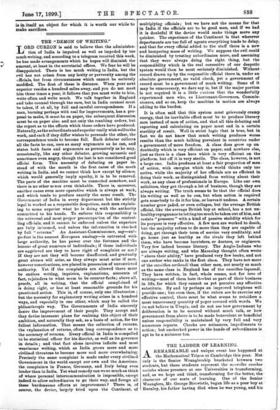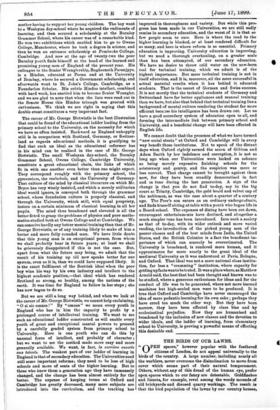THE LADDER OF LEARNING.
AREMARKABLE and unique event has happened at the Mathematical Tripos at Cambridge this year. Not only is the Senior Wranglership bracketed between two students, but these students represent the nonvelles couches sociales whose presence at our Universities is transforming, and, as we hope and think, transforming for the better, the character of our seats of learning. One of the Senior Wranglers, Mr. George Birtwistle, began life as a poor boy at Burnley, his father having died when he was young, and his
mother having to support her young children. The boy went to a Wesleyan day-school where be acquired the rudiments of learning, and then secured a scholarship at the Bnrnley Grammar School, where his career was of a remarkable kind. He won two exhibitions which enabled him to go to Owens College, Manchester, where he took a degree in science, and then he won an entrance scholarship at Pembroke College, Cambridge. And now at the age of twenty-two the poor Burnley youth finds himself at the head of the learned and promising young men of England of the present year. His colleague in the Senior Wranglsrship, Raghernath Paranjpye, is a Hindoo. educated at Poona and at the University of Bombay, where he secured a Government scholarship, and afterwards went to St. John's College, Cambridge, as a Foundation Scholar. His subtle Hindoo intellect, combined with hard work, has enabled him to become Senior Wrangler, and we are glad to note that when the lists were read out in the Senate House this Hindoo triumph was greeted with enthusiasm. We think we are right in saying that this double event constitutes a very important fact.
The career of Mr. George Birtwistle is the best illustration that could be found of the educational ladder leading from the primary school to the University. on the necessity for which we have so often insisted. Backward as England unhappily still is in comparison with Scotland, Germany, or Switzer- land as regards educational methods, it is gratifying to find that such an ideal as the educational reformer has in his mind can be realised in the case of Mr. George Birtwistle. The small Wesleyan day-school, the Burnley Grammar School, Owens College, Cambridge University, constitute a great educational chain, the links of which fit in with one another even better than one might expect. They correspond roughly with the primary school, the gymnasium, the real schule, and the University of Germany. That culture of the mind by classical literature on which Mr. Bryce has very wisely insisted, and which a merely utilitarian ideal would ignore, is conveyed both through the grammar school, whose foundation culture is properly classical, and through the University, which still, with equal propriety, insists on a certain minimum of classical learning in all her pupils. The mind thus broadened and elevated is all the better fitted to grasp the problems of physics and pure mathe- matics studied both at Owens College and at Cambridge. We can conceive hardly any better mental training than that of Mr. George Birtwistle, or of any training likely to make of him a better and more fully rounded man. We have little doubt that this young man is an exceptional person, from whom we shall probably hear in future years; at least we shall be grievously disappointed if this is not the case. But, apart from what the future may bring, we admit that the result of his training up till now speaks better for our system, even as it is, than we could have supposed likely. It is the exact fulfilment of the Scottish ideal when the poor boy wins his way by his own industry and intellect to the highest academic position,—that ideal which has rendered Scotland so strong, so healthy, among the nations of the earth. It was time for England to follow in her steps ; she Las now begun to do so.
But we are still a long way behind, and when we look at the career of Mr. George Birtwistle, we cannot help exclaiming, " 0 si sic omnes !" By " omnes " we mean every youth in England who has in him the capacity to profit by a prolonged course of intellectual training. We want to see such an educational ladder constructed as will enable every youth of great and exceptional mental powers to proceed by a carefully graded system from primary school to University. Here is one youth who can do this by unusual force of intellect, and probably of character ; but we want to see the method made more easy and more generally available. We want, in fact, la carrire ouverte aux talents. The weakest part of our ladder of learning in England is that of secondary education. The Universities need still some important reforms; they need to be less of high schools and more of seats of the higher learning. But to those who knew them a generation ago they have immensely changed, and the change has been almost entirely for the better. The expense of keeping terms at Oxford and Cambridge has greatly decreased, many more subjects are introduced into the curriculum, and the teaching has improved in thoroughness and variety. But while this pro- gress has been made in our Universities, we are still sadly remiss in secondary education, and the worst of it is that so few people seem to care. Here is where the road to the higher learning is blocked, or at least rendered difficult for so many, and here is where reform is so essential. Primary education is improving, University education is improving, but we need a thorough overhauling, on a greater scale than has been attempted, of our secondary education. We have no desire to throw cold water on the new-born zeal for technical training, which we admit is of the highest importance. But mere technical training is not in itself education, and it is, moreover, all the more successful in actual material results when it has behind it educated students. That is the secret of German and Swiss success. It is not merely that the technical students of Germany and Switzerland have far better appliances and manual training than we have, but also that behind that technical training lies a background of mental culture rendering the student far more efficient because his intelligence has been drawn out. Let us have a good secondary system of education open to all, and forming the intermediate link between primary school and University, and a beneficial change will have been effected in English life.
We cannot doubt that the presence of what we have termed "new social strata" at Oxford and Cambridge will in every way benefit those institutions. Not to speak of the distant days when Oxford rightly earned the scorn of Gibbon and Adam Smith by her indolence and corruption, it is not so long ago when our Universities were looked on askance as being merely expensive finishing schools for the aristocracy and gentry, and the suspicion was more or less correct. That charge cannot be brought against them now, for they have been steadily democratised in fact and m tone during the last generation. A sign of the change is that you do not fiud to-day, say in the big court at Trinity, Cambridge, the gold braid and velvet cap of the nobleman, as was the case about a quarter of a century ago. The Peer's son enters as an ordinary undergraduate, and finds himself sitting at table with a youth who began life in a Board-school. The expenses of dining have been cut down, extravagant entertainments have declined, and altogether a much simpler tone has been introduced. Into such a society as that of to-day, with its wider outlook and more varied reading, the introduction of the picked young men of the poorer classes and of the best minds from India, the United States, and the British Colonies is a fact the beneficent im- portance of which can scarcely be overestimated. The University is broadened, is rendered more human, and it approximates far more nearly to the great ideal of the mediaeval University as it was understood at Paris, Bologna, and Oxford. That ideal was not a mere national class institu- tion, far less a "cramming" institution, where capacity for getting up facts was to be tested. It was a place where, as Matthew Arnold said, the best that had been thought and known was to be studied, where a generous enthusiasm for ideas and for the conduct of life was to be generated, where not mere learned machines but high-souled men were to be produced. It is true that Oxford and Cambridge have never encouraged the idea of mere pedantic learning for its own sake ; perhaps they have erred too much the other way. But they have been narrow, they have been affected by class bias and by ecclesiastical prejudice. Now they are humanised and broadened by the inclusion of new classes and the devotion to wider ideals, and the ladder of learning, from elementary school to University, is proving a powerful means of effecting this desirable end.







































 Previous page
Previous page